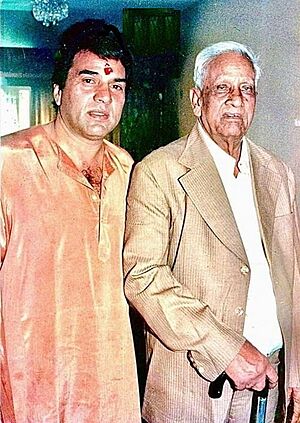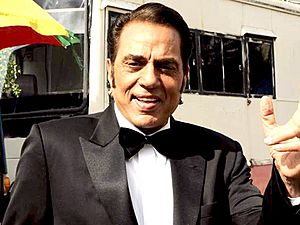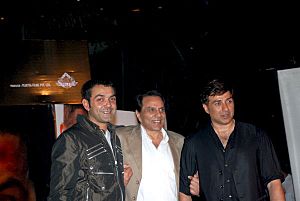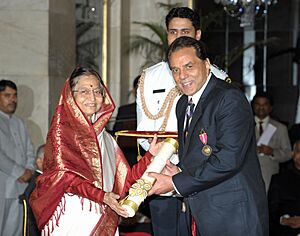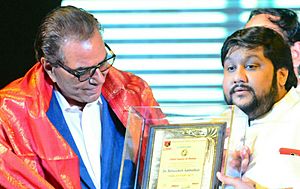Dharmendra facts for kids
Quick facts for kids
Dharmendra
|
|
|---|---|
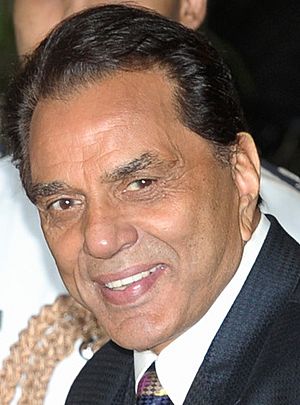 |
|
| Member of Parliament, Lok Sabha | |
| In office 13 May 2004 – 16 May 2009 |
|
| Preceded by | Rameshwar Lal Dudi |
| Succeeded by | Arjun Ram Meghwal |
| Constituency | Bikaner |
| Personal details | |
| Born |
Dharmendra Kewal Krishan Deol
8 December 1935 |
| Died | 24 November 2025 (aged 89) Mumbai, Maharashtra, India |
| Citizenship | British Indian (1935–1947) Indian (1947–2025) |
| Political party | Bharatiya Janata Party |
| Spouses |
|
| Children | 6; (including Sunny, Bobby and Esha) |
| Relatives | See Deol family |
| Alma mater | Ramgarhia College, Phagwara Panjab University, Chandigarh |
| Occupation |
|
| Awards | Padma Bhushan (2012) |
| Signature | |
| Nicknames |
|
Dharmendra Kewal Krishan Deol (8 December 1935 – 24 November 2025), known simply as Dharmendra, was a famous Indian actor, producer, and politician. He was best known for his work in Hindi films. Many people considered Dharmendra one of the greatest and most successful film stars in Indian cinema history.
He had a long career of 65 years, starring in over 300 films. He even held a record for starring in the most hit films in Hindi cinema. Dharmendra started his acting journey in 1960 with the film Dil Bhi Tera Hum Bhi Tere. He became very popular in the mid-1960s with movies like Phool Aur Patthar. Later, he was called India's "He-Man" because of his strong roles in films.
Dharmendra starred in many successful Hindi films from the late 1960s to the 1980s. Some of his most famous movies include Sholay, Seeta Aur Geeta, and Dharam Veer. He also gave amazing performances in films like Satyakam and Chupke Chupke.
From the late 1990s, he started taking on different kinds of roles, called "character roles." He appeared in popular films like Pyaar Kiya To Darna Kya and Rocky Aur Rani Kii Prem Kahaani. In 1997, he received the Filmfare Lifetime Achievement Award for his huge contributions to Bollywood. He also served as a Member of Parliament for Bikaner in Rajasthan from 2004 to 2009, representing the Bharatiya Janata Party.
Contents
Early Life and School Days
Dharmendra Kewal Krishan Deol was born on December 8, 1935. His birthplace was Nasrali, a village in Ludhiana district, Punjab, which was part of British India at the time. His parents were Kewal Krishan and Satwant Kaur. He came from a Punjabi family.
He spent his younger years in the village of Sahnewal. He went to Government Senior Secondary School in Lalton Kalan, Ludhiana. His father was the headmaster at this school. He finished his schooling in Phagwara in 1952. Back then, schools in Punjab were connected to Panjab University, Chandigarh.
Amazing Acting Career
Starting Out in Films (1960s)
Dharmendra won a new talent award from Filmfare magazine. This led him to Mumbai to start his film career. His first movie was Dil Bhi Tera Hum Bhi Tere in 1960. It was a romantic drama.
He found his first big success in 1961 with Shola Aur Shabnam. He then starred in other popular films like Anpadh (1962) and Bandini (1963). Bandini even won a National Film Award.
In 1964, he had a breakthrough role in Ayee Milan Ki Bela. Even though he played a villain, audiences loved him. That same year, he starred in the war-drama Haqeeqat. This film was a huge success. In 1966, he starred in Phool Aur Patthar, which became a blockbuster. This movie made him a very popular star. He also received an award for his acting in Anupama. By 1968, Dharmendra was a major star with hits like Shikar and Ankhen. In 1969, his film Satyakam was highly praised. Many consider it one of his best performances.
Becoming a Superstar (1970s)
The 1970s were a huge time for Dharmendra's career. In 1970, he had several successful films. He also started working often with actress Hema Malini, and they became a very popular on-screen couple.
In 1971, he starred in the action-drama Mera Gaon Mera Desh. This film was an "All Time Blockbuster." It helped establish him as a top action hero. This success also encouraged the film industry to make more action movies.
His stardom continued to grow in 1972 with hits like Seeta Aur Geeta and Raja Jani. These back-to-back successes made him a "superstar." The year 1973 was one of his best, with many successful films. These included Loafer, Jugnu, and Yaadon Ki Baaraat. Yaadon Ki Baaraat is seen as one of the first "masala films" in Indian cinema, mixing different genres.

In 1975, Dharmendra starred in two important films with Amitabh Bachchan. One was the comedy Chupke Chupke. The other was the action film Sholay. Sholay became one of the highest-grossing Hindi films of all time. It was shown in theaters for over five years in some cities. It is still considered a classic Indian film.
He continued his success in 1976 with Charas. In 1977, he had an "All Time Blockbuster" with Dharam Veer. He also starred in the superhit Chacha Bhatija.
Continued Success and New Roles (1980s-2020s)
After 1977, Dharmendra continued to have many successful films. In 1980, he starred in The Burning Train and Ram Balram with Amitabh Bachchan. In 1982, five of his films were successful, including Rajput and Ghazab.
In 1985, he starred in the action-drama Ghulami, which was a superhit. The late 1980s saw him deliver many more successful films. These included Hukumat and Aag Hi Aag in 1987, with Hukumat being the highest-grossing film that year.
As the 1990s began, Dharmendra's roles started to change. His last big hit as a lead actor was Tahalka in 1992. In 1997, he received the Filmfare Lifetime Achievement Award. During his acceptance speech, he shared that he had never won the Best Actor award, despite his many popular films.
From the late 1990s, Dharmendra began taking on "character roles." His first film in this new phase was the romantic comedy Pyaar Kiya To Darna Kya. This film was a superhit.
In 2007, he returned to films with three successful movies: Life in a... Metro, Apne, and Johnny Gaddaar. In 2011, he starred in Yamla Pagla Deewana, which was a box office hit. He also appeared in the family drama Rocky Aur Rani Kii Prem Kahaani in 2023, which was a hit worldwide. His final film was the war drama Ikkis (2025).
Working with Others
Dharmendra had a very successful on-screen partnership with Hema Malini. They starred together in many films, including Sholay, Seeta Aur Geeta, and Charas. They later married.
He also worked with many different directors. His longest collaboration was with director Arjun Hingorani, from 1960 to 1991. They made films like Dil Bhi Tera Hum Bhi Tere and Kab? Kyoon? Aur Kahan?. He also worked often with director Anil Sharma on movies like Hukumat and Apne.
Films in Other Languages
Dharmendra also acted in films in other languages. In 1966, he appeared in the Bengali film Paari.
He also starred in several films in his native Punjabi. These included Kankan De Ohle (1970), Putt Jattan De (1982), and Double Di Trouble (2014).
Other Important Work
Serving in Politics
Dharmendra was a Member of Parliament in India's Lok Sabha. He represented the Bikaner area in Rajasthan from 2004 to 2009. He was part of the Bharatiya Janata Party.
On Television
In 2011, Dharmendra became a judge on the popular reality show India's Got Talent. The show became very popular with him as a judge.
In 2023, he took on his first acting role on television. He played Salim Chisti in the historical series Taj: Divided by Blood, which is available on ZEE5.
Producing Movies
In 1983, Dharmendra started his own production company called Vijayta Films. Their first movie, Betaab, launched his elder son Sunny Deol as an actor. It was a very successful film.
In 1990, he produced the action film Ghayal, also starring Sunny Deol. This film won seven Filmfare Awards, including Best Film. It also won a National Film Award. In 1995, he produced Barsaat to launch his younger son Bobby Deol.
His Legacy
Dharmendra is remembered as one of the most important people in Indian cinema. In his early career, he was considered one of the most handsome men in the world. He was known as the "He-Man" of Bollywood.
Rediff.com listed him among the "Top 10 Bollywood Actors of All Time." His performances in films like Satyakam and Sholay are highly regarded. Sholay was even named the "Filmfare Best Film of 50 years" in 2005.
Many famous actors admired Dharmendra. Dilip Kumar once said he wished he was as handsome as Dharmendra. Salman Khan said he admired Dharmendra more than anyone else. Jaya Bachchan called him a "Greek god" and said he was the most handsome man in the industry.
Dharmendra holds a unique record. He had seven successful films in a single year twice. This happened in 1973 and again in 1987. In 2022, Outlook India included him in their list of "75 Best Bollywood Actors."
Family Life
Dharmendra married Prakash Kaur in 1954, before he became an actor. They had two sons, Sunny Deol and Bobby Deol, who both became successful actors. They also had two daughters, Vijeta and Ajeeta.
Later, Dharmendra married actress Hema Malini. They starred together in many movies, including Sholay. They had two daughters, Esha Deol (an actress) and Ahana Deol. His grandson, Bobby Deol's son, is named "Dharam" after him.
Dharmendra had a farmhouse in Lonavala, where he spent his later years. His family lives in Juhu, Mumbai. In 2023, Dharmendra expressed that his family's contributions to Indian cinema were not always fully recognized.
Health and Final Days
Between 2015 and 2020, Dharmendra faced several health challenges. These included back pain and muscle strain, sometimes requiring hospital visits. In 2025, he had surgery for a damaged eye.
He was admitted to Breach Candy Hospital on October 31, 2025, due to breathing difficulties. He was discharged after a few hours once his condition improved.
On November 10, 2025, Dharmendra was again admitted to Breach Candy Hospital with respiratory issues. His wife, Hema Malini, shared on social media that he was receiving continuous medical care. His condition became critical, and he was placed on ventilator support.
On November 11, 2025, false rumors spread on social media and news channels claiming that Dharmendra had passed away. Even some public figures mistakenly mourned his death. However, Hema Malini and his daughter Esha Deol quickly clarified that he was alive and stable. They criticized the spread of such incorrect information.
Death
Dharmendra passed away on November 24, 2025, at the age of 89, at his home. He is survived by his wives, six children, and thirteen grandchildren.
Filmography
Accolades and honours
Civilian award
- 2012 – Padma Bhushan, India's third highest civilian honor from the Government of India
National Film Awards
- 1990 – Best Popular Film Providing Wholesome Entertainment – Ghayal
Filmfare Awards
| Year | Category | Film | Result |
|---|---|---|---|
| 1965 | Best Supporting Actor | Ayee Milan Ki Bela | Nominated |
| 1967 | Best Actor | Phool Aur Patthar | Nominated |
| 1972 | Mera Gaon Mera Desh | Nominated | |
| 1974 | Yaadon Ki Baaraat | Nominated | |
| 1975 | Resham Ki Dori | Nominated | |
| 1984 | Best Comedian | Naukar Biwi Ka | Nominated |
| Best Film | Betaab | Nominated | |
| 1991 | Best Film | Ghayal | Won |
| 1997 | Lifetime Achievement Award | — | Won |
Other awards and recognitions
- In the mid-1970s, Dharmendra was voted one of the most handsome men in the world.
- He received a Special Award for his "contribution in Indian Cinema" at the Kalakar Awards.
- He received the "Living Legend Award" from FICCI for his outstanding work in Indian entertainment.
- In 2003, he received a Lifetime Achievement Award at the Sansui Viewers' Choice Movie Awards.
- In 2004, he was honored for Best Contribution to Indian Cinema.
- In 2005, he received the Zee Cine Award for Lifetime Achievement.
- In 2007, he was awarded a Lifetime Achievement Award at the Pune International Film Festival (PIFF).
- In 2007, he received an IIFA Lifetime Achievement Award.
- In 2007, he received an award for Humanitarian Services to the Indian Nation.
- In 2007, the Punjabi newspaper Quami Ekta honored him for his contributions to Indian cinema.
- In 2008, he was named "Actor Par Excellence" at the Max Stardust Awards.
- In 2008, he received a Lifetime Achievement Award at the 10th Mumbai Academy of the Moving Image (MAMI) International Film Festival.
- In 2009, he received a Lifetime Achievement Award at the Nashik International Film Festival (NIFF).
- In 2010, he was honored as the Big Star Entertainer for his half-century of excellence at the BIG Star Entertainment Awards.
- In 2011, he received a Lifetime Achievement Award at the Apsara Film & Television Producers Guild Award.
- In 2011, he received a "Salaam Maharashtra Award" for completing 50 years in the film industry.
- In 2011, he was honored with "The ITA Scroll Of Honour" at the Indian Television Academy Awards.
- In 2017, he was honored with the Dr Babasaheb Ambedkar Nobel award at Mumbai.
- In 2020, he was honored with a "Lifetime Achievement Award" by the state of New Jersey in the United States. This was for his huge contributions to Hindi Cinema over six decades and more than 300 films.
See also
 In Spanish: Dharmendra para niños
In Spanish: Dharmendra para niños
 | Aaron Henry |
 | T. R. M. Howard |
 | Jesse Jackson |


